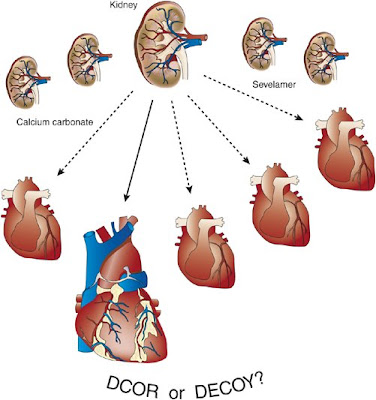 The DCOR Trial was a Genzyme-funded randomized control trial--somebody recently told me the largest ever conducted in a dialysis population--designed to compare the phosphate binder sevelamer (Renagel) with Ca-containing phosphate binders (calcium acetate a.k.a. Phoslo or calcium carbonate). The theory behind the trial is that since cardiovascular disease is the #1 killer of ESRD patients, and since vascular calcifications are hypothesized to cause accelerated atherosclersosis, then a non-calcium-containing phosphorus binder such as sevelamer would be expected to not contribute as much to vascular calcifications and cardiovascular disease.
The DCOR Trial was a Genzyme-funded randomized control trial--somebody recently told me the largest ever conducted in a dialysis population--designed to compare the phosphate binder sevelamer (Renagel) with Ca-containing phosphate binders (calcium acetate a.k.a. Phoslo or calcium carbonate). The theory behind the trial is that since cardiovascular disease is the #1 killer of ESRD patients, and since vascular calcifications are hypothesized to cause accelerated atherosclersosis, then a non-calcium-containing phosphorus binder such as sevelamer would be expected to not contribute as much to vascular calcifications and cardiovascular disease.Sounds good, but the primary end-point of mortality was identical in the two groups. In "sub-group analysis", there was allegedly a trend towards benefit in the sevelamer group in those >65 years of age or those who had been taking the medication for >2 years, but overall there seems to be a consensus that this represents a negative trial.
In related news, sevelamer costs significantly more than calcium acetate (and certainly more than calcium carbonate for that matter). You make the call as to which phosphate binder is better for your patients...

No comments:
Post a Comment
Renal Fellow Network encourages comments and discussion regarding the posts. Do not post any comments that are commercial or advertising in nature. Posts will be deleted if commercial or advertising comments are made. Internet users commenting on the Renal Fellow Network must post information which is true and correct to their knowledge. Sources to health/medical claims must be provided when relevant. Moderators reserve the right to erase, without notification, any comment they would judge inappropriate.